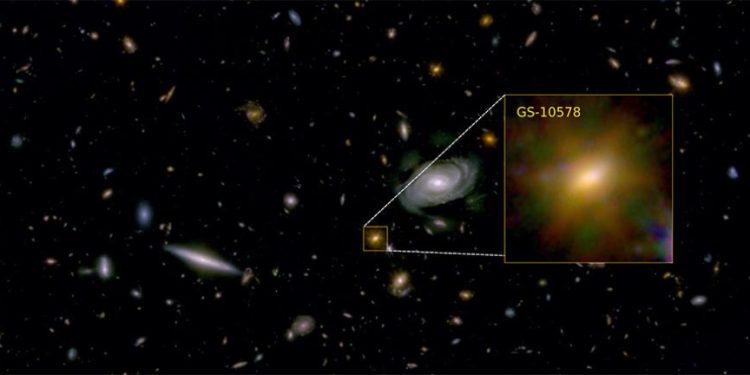Astronomers using the James Webb Space Telescope have made a groundbreaking discovery, confirming that supermassive black holes can cut off their host galaxies from the essential gas needed to form new stars. The findings, published in Nature Astronomy, reveal how these black holes starve galaxies, ultimately halting their ability to produce new stars.
An international team of researchers, co-led by the University of Cambridge, observed a galaxy roughly the size of the Milky Way just two billion years after the Big Bang. This galaxy, officially known as GS-10578 but dubbed “Pablo’s Galaxy,” stands out for being essentially ‘dead,’ as it has ceased the formation of new stars.
The Death of a Galaxy
The researchers discovered that this galaxy’s supermassive black hole is expelling gas at incredible speeds—around 1,000 kilometers per second. These gas winds, powerful enough to escape the galaxy’s gravitational pull, are effectively cutting off the galaxy’s fuel supply for star formation. “We knew this galaxy wasn’t forming many stars, given its size, but Webb allowed us to confirm that the black hole is the culprit,” said Dr. Francesco D’Eugenio from Cambridge’s Kavli Institute for Cosmology.
Using Webb’s superior sensitivity, astronomers were able to detect a new component of gas that had not been visible with earlier telescopes. This gas, colder and denser, does not emit light, but Webb detected it because it blocks light from behind the galaxy. The amount of gas being ejected from Pablo’s Galaxy far exceeds what the galaxy would need to continue forming stars, confirming that the black hole is starving its host galaxy.
Black Holes and the Halt of Star Formation
Prior to this study, scientists theorized that black holes could play a role in halting star formation, but direct evidence had been elusive. Earlier models predicted that the cessation of star formation would have violent, disruptive effects on galaxies, leading to their collapse or destruction. However, the stars in Pablo’s Galaxy still orbit in an orderly fashion, suggesting that this process can be far more subtle than previously thought.
Professor Roberto Maiolino, co-author from the Kavli Institute for Cosmology, added, “We’ve long known black holes have a significant impact on galaxies, but this study shows just how crucial they are in halting star formation. The fact that this massive galaxy stopped forming stars so early in the universe’s history is both fascinating and puzzling.”
A Closer Look at the Early Universe
This discovery adds to the growing list of findings made possible by the James Webb Space Telescope, offering an unprecedented look into the early universe. Webb’s ability to detect cold, dark gas components allows scientists to understand how galaxies evolve and how supermassive black holes influence their development. New observations from the Atacama Large Millimeter/Submillimeter Array (ALMA), which will target the coldest parts of Pablo’s Galaxy, are expected to shed even more light on this galaxy’s evolution and the ongoing impact of its black hole.
As scientists continue to unlock the mysteries of the universe, this discovery offers a glimpse into the complex relationship between black holes and galaxies. What does the future hold for galaxies like Pablo’s? Will new discoveries change our understanding of galactic evolution?
Do you believe that black holes could be more involved in galaxy death than previously thought? How do you think this discovery will shape future research on galactic evolution? In the coming years, more data from observatories like Webb and ALMA will likely lead to even deeper insights into the role black holes play in the universe’s evolution. As we continue to push the boundaries of space exploration, the question remains: how many galaxies are silently dying, starved of their lifeblood by the very black holes they host? Stay tuned for more as scientists piece together this cosmic puzzle.











